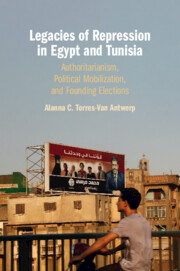 Legacies of Repression in Egypt and Tunisia
Legacies of Repression in Egypt and Tunisia from Part II - Phoenix from the Ashes
Published online by Cambridge University Press: 10 March 2022
Chapter 5 expands the tracing of the theorized causal mechanisms beyond Egypt to see how far these mechanisms travel and if they operate in the same way across other cases of founding elections. Each case comparison begins with an analysis of the processes of party formation, linking the political opportunity structure of the authoritarian era to the contours of the ideological landscape and the strategic incentives facing different groups at this juncture. Each case then examines the evidence for the mechanisms linking the authoritarian era political opportunity structure to the organizational and persuasive resources available to each political group and their ability to use different mobilization tactics. As in Egypt, opposition groups that were excluded from electoral participation possess similar organizational and symbolic resources and thus are able to use more effective voter mobilization tactics than other political groups, resulting in their electoral success. The accounts find evidence for this causal chain in Tunisia, Poland, Czechoslovakia, and Zambia, but the mechanism operates differently in the case of Brazil, offering useful insight into the scope conditions under which the mechanisms theorized in the Egypt case operate elsewhere.
To save this book to your Kindle, first ensure [email protected] is added to your Approved Personal Document E-mail List under your Personal Document Settings on the Manage Your Content and Devices page of your Amazon account. Then enter the ‘name’ part of your Kindle email address below. Find out more about saving to your Kindle.
Note you can select to save to either the @free.kindle.com or @kindle.com variations. ‘@free.kindle.com’ emails are free but can only be saved to your device when it is connected to wi-fi. ‘@kindle.com’ emails can be delivered even when you are not connected to wi-fi, but note that service fees apply.
Find out more about the Kindle Personal Document Service.
To save content items to your account, please confirm that you agree to abide by our usage policies. If this is the first time you use this feature, you will be asked to authorise Cambridge Core to connect with your account. Find out more about saving content to Dropbox.
To save content items to your account, please confirm that you agree to abide by our usage policies. If this is the first time you use this feature, you will be asked to authorise Cambridge Core to connect with your account. Find out more about saving content to Google Drive.